
Mantidae is one of the largest families in the order of praying mantises, based on the type species Mantis religiosa; however, most genera are tropical or subtropical. Historically, this was the only family in the order, and many references still use the term "mantid" to refer to any mantis. Technically, however, "mantid" refers only to members of the family Mantidae, and not the 14 remaining families of mantises. Some of the most recent classifications have promoted a number of the mantid subfamilies to the rank of family, e.g. Iridopterygidae, Sibyllidae, Tarachodidae, Thespidae, and Toxoderidae, while other classifications have reduced the number of subfamilies without elevating to higher rank.

Hymenopodidae is a family of the order Mantodea (mantises), which contains six subfamilies. Some of the species in this family mimic flowers and are found camouflaged among them; these are called flower mantises. Their coloration is aggressive mimicry, luring prey to approach close enough to be seized and eaten.

Hymenopodinae is a subfamily of the mantis family Hymenopodidae.
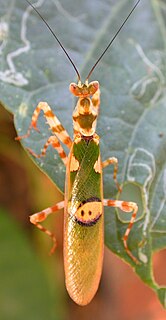
Creobroter is a genus of flower mantises in the tribe Hymenopodini; species are concentrated in Asia. The name comes from the Greek kreo-, meaning "flesh") and broter" meaning "eating", therefore, "flesh-eating", an apt name for a predatory insect. Both sexes have long wings and are capable fliers. Full-grown males are about 3 to 4 cm in length; females are about 4 to 5 cm.

Acromantinae is a subfamily of the mantis family Hymenopodidae which contains two tribes and about 13 genera.

Rhombodera is a genus of praying mantises native to Asia and possessing common names such as shield mantis, hood mantis, and leaf mantis because of their extended, leaf-like thoraxes.
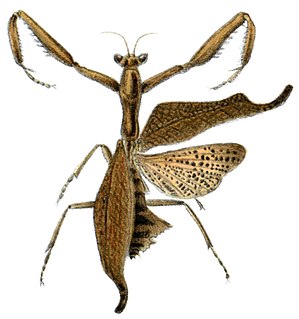
Acanthops is a genus of mantises in the family Acanthopidae, containing 20 species that can be found in Central and South America.
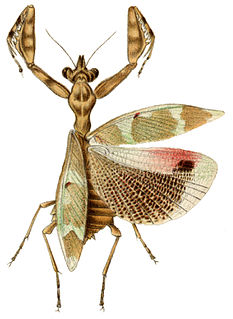
Callibia is a genus of praying mantis in the family Acanthopidae. The genus contains only one species, Callibia diana.
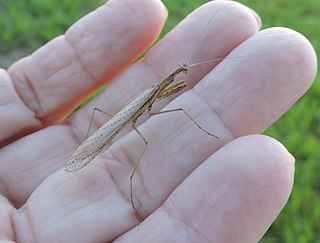
Thespidae is a family of Neotropical insects in the order Mantodea. Following a major revision of this order in 2019, the old-world subfamilies Haaniinae and Hoplocoryphinae, previously placed here, have been upgraded to family level.

Acanthopidae is a family of mantises consisting of 16 genera in the order Mantodea. The group was first formally split off as a separate family by the German entomologist Reinhard Ehrmann in 2002. In 2016, five genera were moved from Acanthopidae to the newly created family Acontistidae, but this has not been accepted in most recent classifications.
Callimantis is a genus of mantis of the family Epaphroditidae consisting of only one species, Callimantis antillarum.
Phasmomantis is a genus of mantis of the family Mantidae.
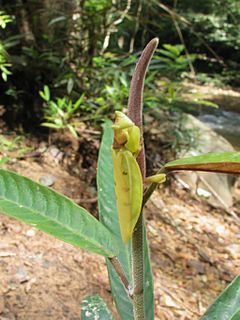
Helvia is a genus of praying mantises in the family Hymenopodidae found in Southeast Asia. It is monotypic, being represented by the single species, Helvia cardinalis.

Miomantidae is a family of praying mantises in the order Mantodea.

Tropidomantis is a genus of praying mantis in the family Nanomantidae, with species recorded from Asia and the Pacific islands.

Hapalopeza is an Asian genus of praying mantis in the family Gonypetidae. Two species, previously placed here, are now in the genus Spilomantis.

Acontistini is a tribe of neotropical mantids in the superfamily Acanthopoidea, and family Acanthopidae. There are 7 genera and more than 30 described species in Acontistini. In 2016, several genera were moved from Acanthopidae to a newly created family Acontistidae, but this has not been accepted in most recent classifications.
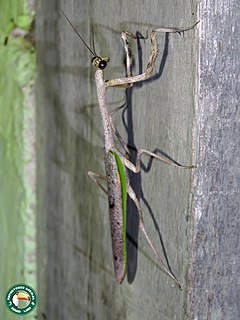
Pseudovates is a genus of praying mantis in the family Mantidae. There are more than 20 described species in the genus Pseudovates, and are found in North, Central, and South America.
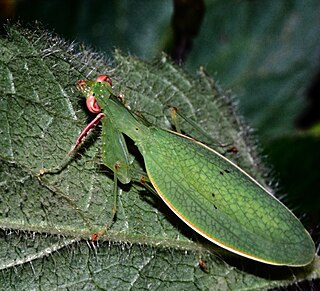
The Nanomantidae are a new (2019) family of praying mantises, based on the type genus Nanomantis. As part of a major revision of mantid taxonomy, genera and tribes have been moved here, substantially replacing the old family Iridopterygidae.

Eomantis is a genus of praying mantis in the subfamily Tropidomantinae and tribe Tropidomantini, with species recorded from Asia.


















